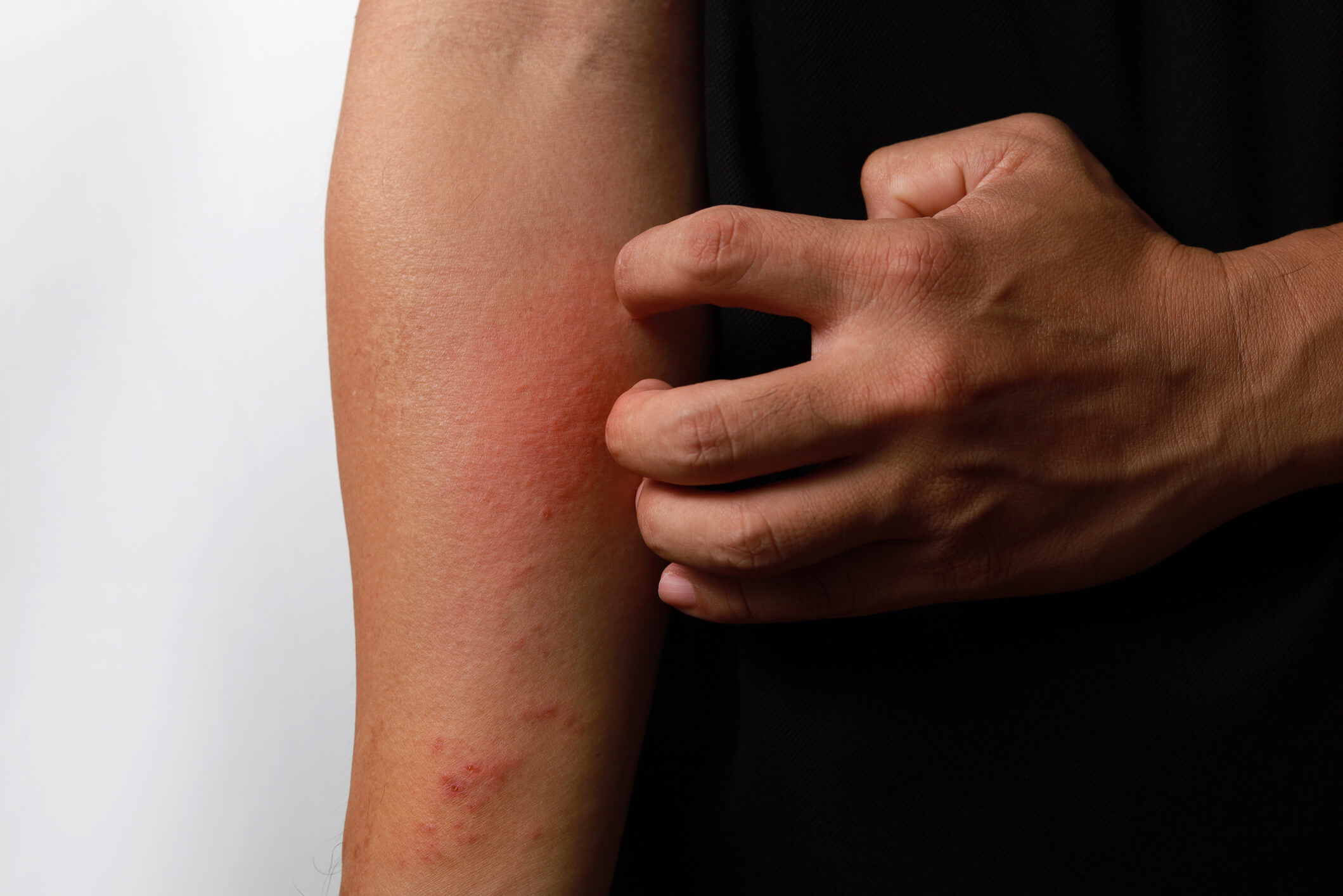Some practical guidance on how to manage your Eczema
5 Key Eczema Management Tips
Skincare
As difficult as it might be, don’t scratch your skin. This will only make things worse and might even cause your skin to crack or break which could lead to infection. A cool moisturiser or gel should help to ease the itch and you might find that wearing cotton gloves to bed will protect against scratching in your sleep.
When showering or bathing, ensure that the water is not too hot. Use a gentle cleanser and try not to scrub your skin. Never use an exfoliator as this could cause the skin to break.
Pat your skin dry and apply moisturiser whilst it is still damp to fully lock in the moisture. Cotton towels may be less irritating to use on your skin.
Thicker emollients such as creams or ointments tend to work better for moisturising very dry skin. Where possible, choose products that don’t contain fragrance as these can sometimes be an irritant for eczema. Moisturise every morning and evening and after you shower or bathe. Apply hand cream whenever you wash your hands.
Sunscreen is very important so always protect your skin with a broad spectrum sunscreen with an SPF of 30 or over. Many brands will now have a range suitable for more sensitive skin which should be less irritating.
Be consistent! Taking care of your skin can be time consuming but following a daily regimen will help you to maintain some control over your skin and to protect it as well as possible. It's time to make your own change. (1, 2)
Mental health
With over 30% of people with eczema diagnosed with depression and/or anxiety, it is important that you take care of your mental health.
Stress will always have an adverse effect on your eczema so finding ways to relieve it can be hugely helpful. This can include meditation, yoga, exercise or breathing techniques.
Make time to do the things you enjoy, whether that’s meeting with friends, reading a book or spending time at your favourite hobby.
Keep talking! Remember that your friends, family and healthcare team want to help with your eczema support, so keep the lines of communication open and let them know how your skin is making you feel.
Meditation can be hugely helpful in relieving stress and there are many free apps available which you can use to guide you.
Try to incorporate regular exercise into your lifestyle as this will benefit both your physical and mental health.
There are a range of eczema support groups online and it can often be very helpful to chat to others who are experiencing similar issues with their skin and who can truly understand how you are feeling.
Sleep is very important in helping to maintain a healthy lifestyle, but sleeping when itchy can be difficult. Try to have a warm bath before bedtime and moisturise thoroughly. Wear light cotton clothing. Keep nails short and if needed, wear cotton gloves to prevent scratching. Ensure that your bedroom is cool and dust free. 3
What NOT to wear
The fabrics that you wear can have a huge impact on how comfortable your skin may feel. Looser clothing will allow your skin to breathe
Always wash new clothes before wearing using a mild laundry detergent to ensure that all irritants and chemicals are removed
Gentle fabrics that will be kinder to skin include cotton, silk, merino wool and washed linen. Try to avoid fabrics that contain a high level of nylon or polyester or clothing that includes pure wool or alpaca. Lace clothing can often irritate itchy skin. (4, 5)
Work
If you are comfortable doing so, talk to your line manager and/or HR about your condition. Explain how eczema, e.g., flare-ups, may impact your work. You don’t need to go into detail but maybe discuss flexible working and ways in which your condition can be managed without adversely impacting your productivity.
It’s always better to talk to your colleagues about your eczema. Explain to them how the condition affects your life and educate them on how they can help. Many people might feel awkward on how to talk to you about this and may not realise that eczema is not contagious, so broaching that initial conversation will make it easier for everyone.
Avoid situations that might trigger your itch. Ensure you stay well hydrated and avoid extreme temperatures of hot or cold that might irritate your eczema.
Keep some emollient at your desk or in your locker. Apply to hands after washing and if you feel particularly itchy, try to apply emollient to your body during the day to help ease your skin. (7, 8)
Exercise
Don’t let your eczema prevent you from exercising. Experiment and find an exercise that suits you and your skin. Moisturise before and after as this will help protect your skin. Ensure you are wearing the correct clothing that won’t irritate your skin as your body heats up. Low impact exercise can be preferable as you will avoid a build up of sweat on your skin. Stay hydrated! Ensure you drink water during and after your exercise If you sense that your skin is being exacerbated by your activity, take a break. Bring your own shower gels, shampoos and body moisturisers. (6)
Please consult your Healthcare professional for further information
1. https://www.aad.org/public/diseases/eczema/atopic-dermatitis-coping
2. https://www.everydayhealth.com/eczema/skin-care-routine.aspx
3. https://nationaleczema.org/eczema-emotional-wellness/
4. https://eczema.org/information-and-advice/triggers-for-eczema/clothing-and-eczema/#:~:text=Cotton%20(preferably%20100%25)%20tends,the%20skin%20to%20'breathe'.
5. https://eczema.org/wp-content/uploads/171-Exchange-Clothing.pdf
6. https://nationaleczema.org/blog/eczema-exercise/
7. https://eczema.org/information-and-advice/living-with-eczema/eczema-at-work/
8. https://www.webmd.com/skin-problems-and-treatments/eczema/eczmea-your-job
Date Accessed: April 2023
Date of preparation: June 2023 | IE-ABBV-230034
Information placed on this website is not intended as a substitute for consultation with your health care professional.
AbbVie Ireland: 14 Riverwalk, Citywest Business Campus, Dublin 24, D24 XN32, Ireland.
Tel (0) 1 4287900
www.abbvie.ie








